The #endSARS Movement In Nigeria: What to Know
People across the world are standing in solidarity with Nigerians protesting the country's Special Anti-Robbery Squad.
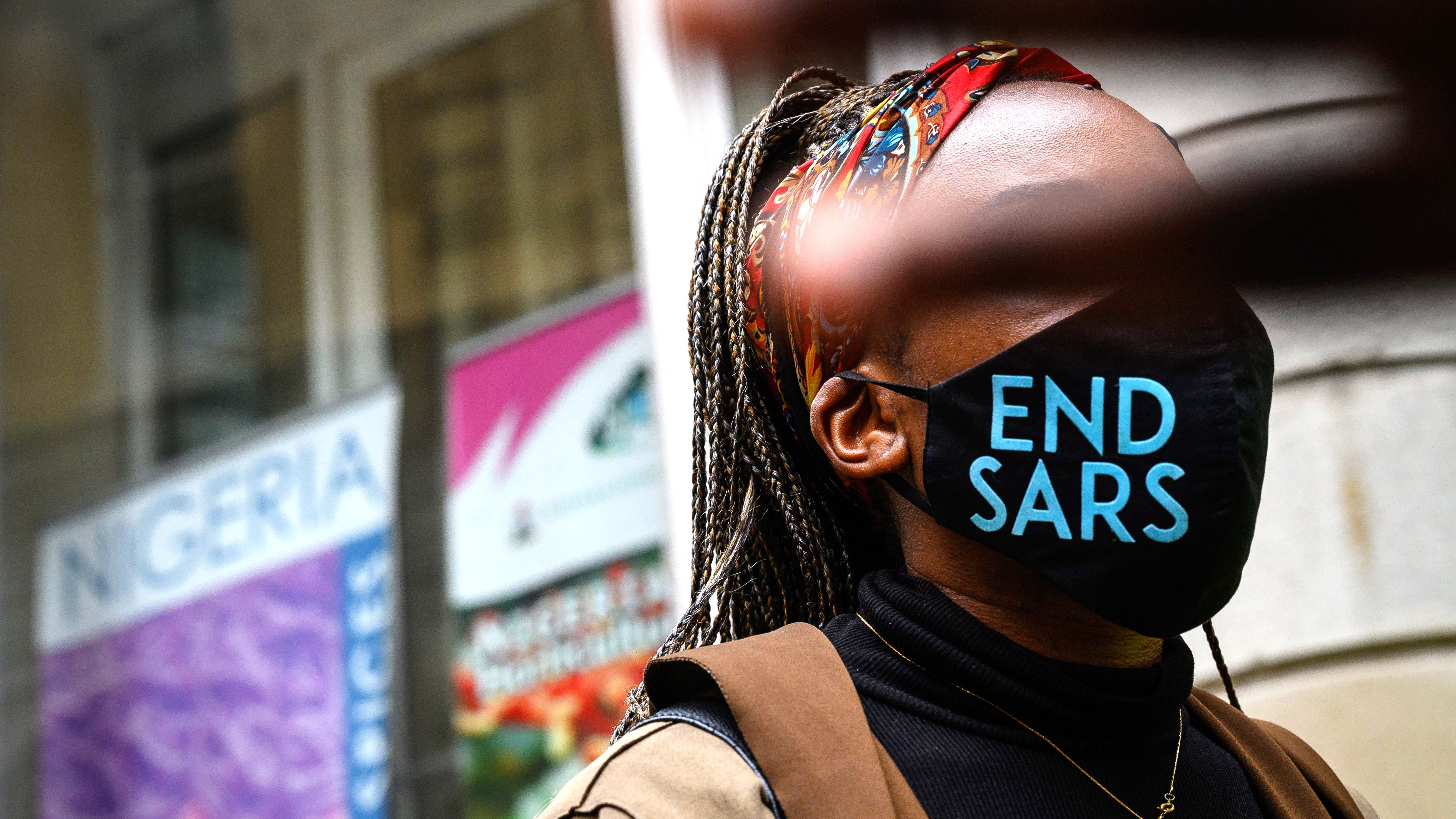
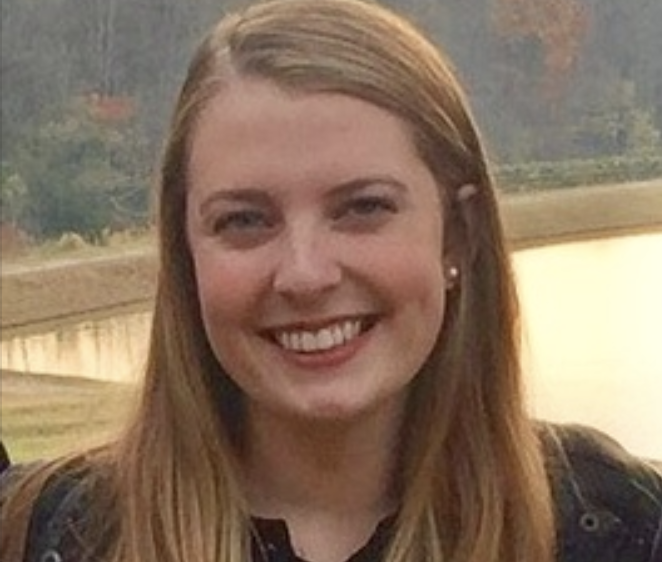
The #endSARS hashtag has begun trending across the globe this week after an Amnesty International investigation found that at least 12 peaceful protestors in Nigeria had been killed on Oct. 20 by the very form of police brutality they were protesting. Massive groups of young Nigerians have been gathering and marching against SARS, the nation's Special Anti-Robbery Squad of armed police, since early October, when a video surfaced that appeared to show SARS officers shooting a young man dead from their vehicle and immediately driving away, the BBC reports.
The Oct. 20 shootings occurred in two suburbs of Lagos, with Amnesty International reporting that government officials had removed nearby surveillance cameras before police and military members opened fire on the thousands of gathered protestors, and allegedly took away some of the people they had injured or killed.
"Opening fire on peaceful protesters is a blatant violation of people's rights to life, dignity, freedom of expression, and peaceful assembly. Soldiers clearly had one intention—to kill without consequences," Osai Ojigho, country director of Amnesty International Nigeria, said in a statement. "These shootings clearly amount to extrajudicial executions. There must be an immediate investigation and suspected perpetrators must be held accountable through fair trials."
Here's what you need to know about SARS and the ongoing #endSARS protests and global movement.
What is SARS?
The Special Anti-Robbery Squad was established in 1992 as a branch of the Nigerian Police Force dedicated to dealing with violent crimes including armed robberies, cattle rustling, and kidnapping. Before long, however, SARS became notorious across the country for its deep-seated corruption and brutal treatment of detainees that amount in many cases to severe human rights violations. SARS reportedly primarily targets young Nigerian men, especially those who dress well, sport tattoos and dreadlocks, and own cars, iPhones, and other pricey goods—all criteria that the police use to profile and prosecute the men as thieves without evidence. (This is why one popular slogan of the #endSARS protests is "To be modern is not a crime.")
Though the government has disbanded and reorganized SARS multiple times and passed legislation banning police torture in 2017, the group's violence has continued. Between Jan. 2017 and May 2020 alone, SARS was linked to at least 82 cases of torture, ill treatment and extrajudicial execution, per Amnesty International.
After the most recent disbandment of SARS, on Oct. 11, the Nigerian Police Force established in its place the Special Weapons and Tactics unit. However, according to the BBC, many Nigerians are concerned that SWAT is merely a rebranding, rather than a reform, of SARS, with many former members of SARS simply reassigned to SWAT and no mechanism in place to prevent them from continuing their violent methods of so-called "law and order."
Stay In The Know
Get exclusive access to fashion and beauty trends, hot-off-the-press celebrity news, and more.
What is #endSARS?
The #endSARS movement and accompanying hashtag began in 2017, Time reports. The protests against police brutality and corruption have no formal leader, but are predominantly organized and populated by young Nigerians, who have been disproportionately targeted by the violent police squad. The latest wave of protests began on Oct. 8, and have continued every day since in many major Nigerian cities and towns.
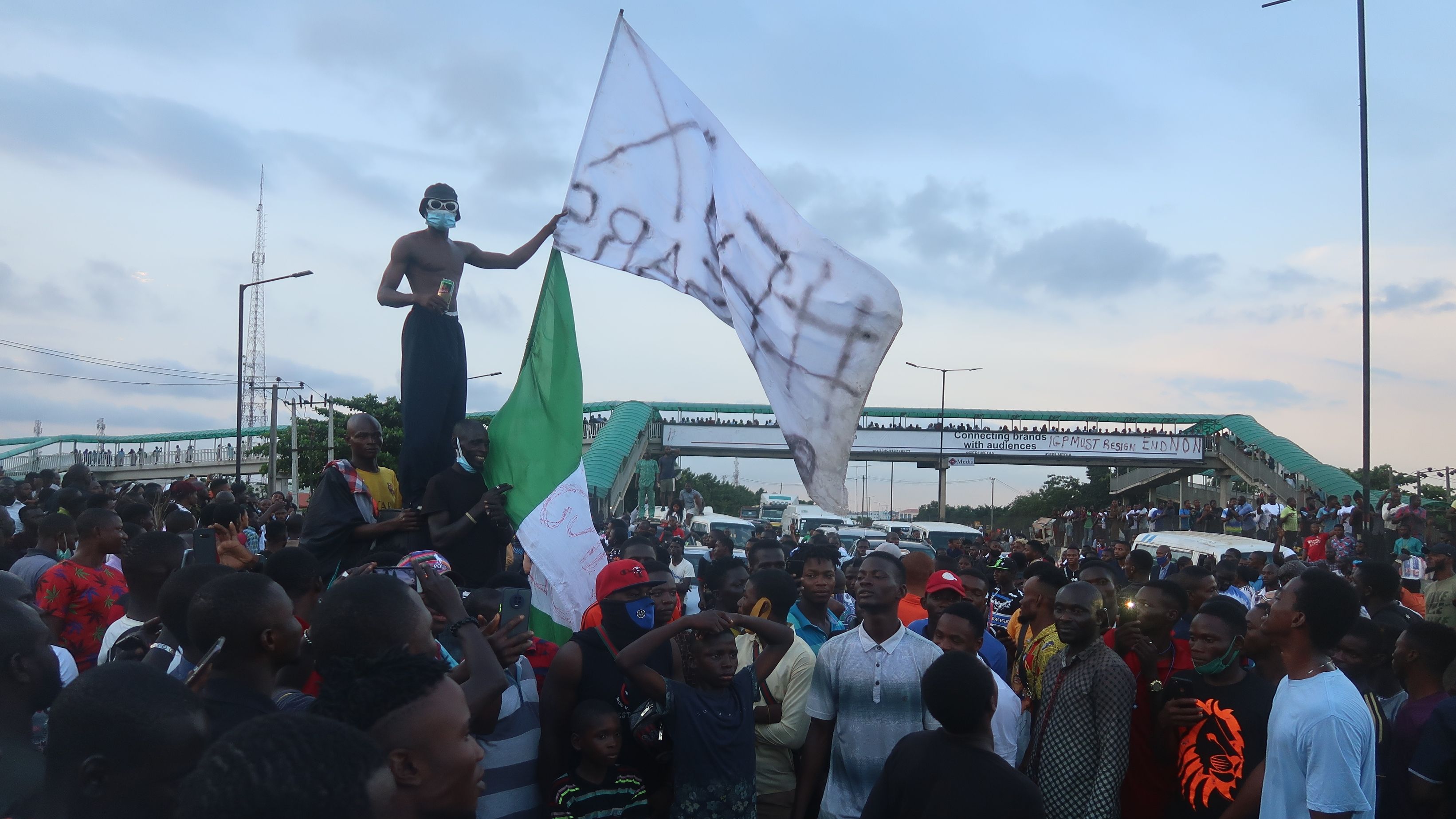
#endSARS protests in Lagos, Nigeria.
These peaceful protests against police brutality have been consistently met with even more police brutality and excessive force, with SARS members and soldiers using water cannons, tear gas, and live ammunition on the protestors. By Oct. 15, according to Amnesty International, at least 10 protestors had been killed. The death toll reportedly doubled on Oct. 20, with the human rights organization estimating that at least 28 people were killed in widespread attacks on Oct. 20, including the mass shootings in Lagos suburbs Lekki and Alausa. A total of 56 Nigerians are believed to have been killed and hundreds more injured since the protests began.
A Time report by Abuja, Nigeria-based writer and political analyst Gimba Kakanda describes in horrific detail the violent treatment he faced while attending an #endSARS protest on Oct. 11. Kakanda described how police grabbed and smashed his phone and beat him up before transporting him to police headquarters. There, he wrote, he was told by the officers' superior that "we were lucky that the encounter was in the day rather than at night, because if it was at night, they would have killed us and erased every trace of our existence."
The protestors have five primary demands: the immediate release of all detained protestors; justice for police brutality victims and their families; the establishment of an independent oversight group to investigate reports of police misconduct; psychological evaluation and retraining of all SARS officers before reassignment; increased police salaries to dissuade corruption and reward their protection of the nation's citizens.
Additionally, as time has gone on with no effective reforms to police tactics, the #endSARS movement has only expanded to encompass more demands from protestors. As detailed by Kakanda and in an Oct. 20 segment of The Daily Show, Nigerians are now marching for all-encompassing social revolution, including improved jobs, schools, and infrastructure, and an end to all government corruption, in addition to putting a stop to police brutality.
How has the Nigerian government responded?
Following the Oct. 20 shootings, Nigerian President Muhammadu Buhari's office released a statement on Oct. 21 asking for "understanding and calm" as the administration implements "a set of reform policies that will deliver a police system accountable to the Nigerian people," the BBC reports. However, the statement did not refer directly to the tragic deaths of dozens of Nigerians that had occurred the day before.
In Lagos, Governor Obaijide Sanwo-Olu said in a televised briefing on Oct. 21 that he was ordering an investigation into the attacks in Lekki, Time reports, though he asserted that no one had been killed in the attacks.
Additionally, government officials have reportedly implemented 24-hour curfews in several regions across the country, affecting millions of Nigerians.
How has the rest of the world joined the #endSARS movement?
After the latest wave of peaceful protests against SARS and SWAT were met by even more police violence on Oct. 20, the rest of the world has taken heed, launching protests of their own and supporting the protestors' mission by signing petitions and increasing visibility of the protests on social media.
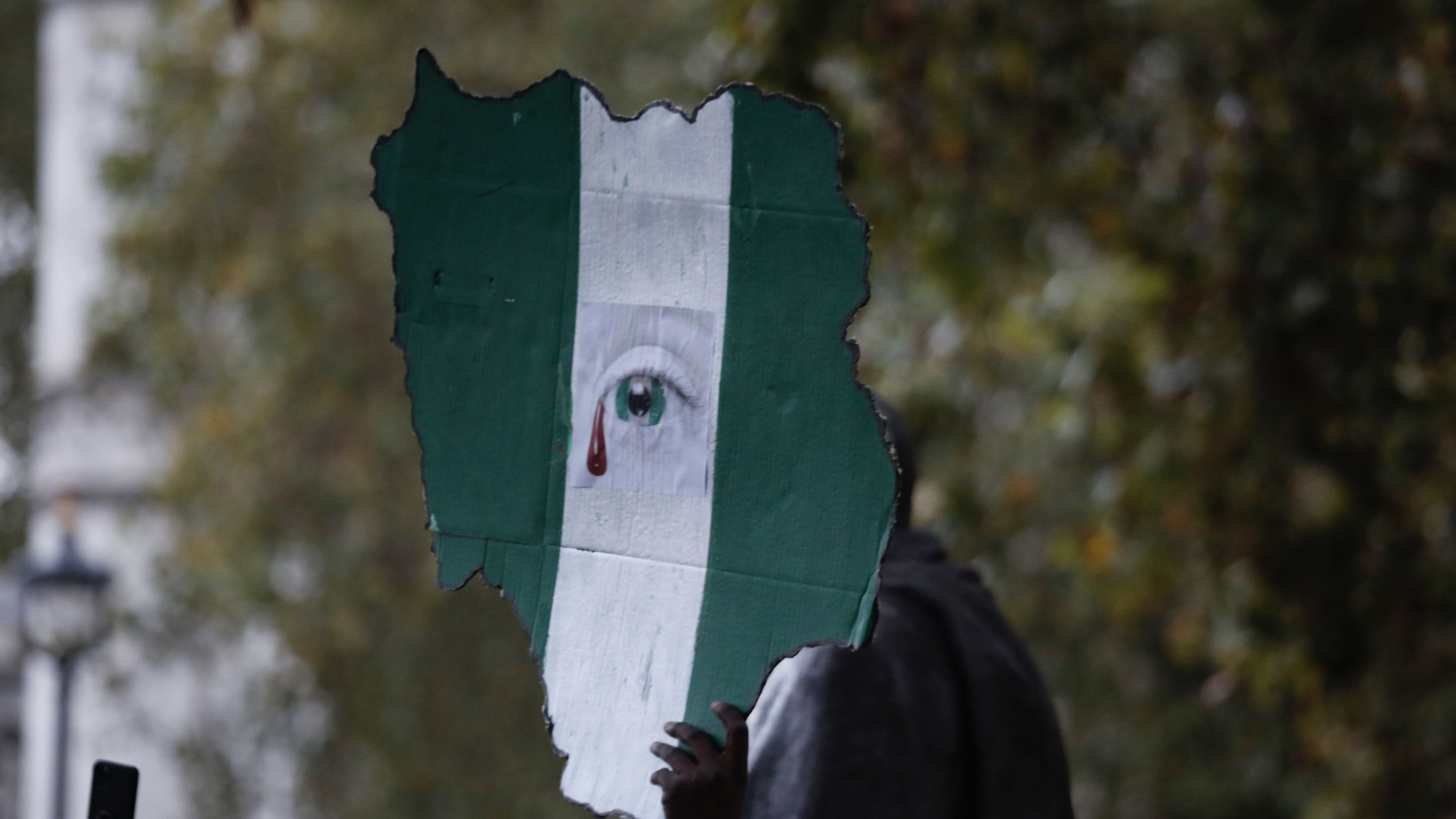
A #endSARS protester in London.
In an Oct. 21 statement, the United Nations Secretary-General condemned the previous day's violence, calling for "an end to reported police brutality and abuses," and encouraging local authorities "to swiftly explore avenues to de-escalate the situation."
Though Donald Trump has yet to condemn or even comment on the violence, Joe Biden released a statement about the police and military's reaction to the peaceful protests: "I urge President Buhari and the Nigerian military to cease the violent crackdown on protesters in Nigeria, which has already resulted in several deaths," he said. "The United States must stand with Nigerians who are peacefully demonstrating for police reform and seeking an end to corruption in their democracy. I encourage the government to engage in a good-faith dialogue with civil society to address these long-standing grievances and work together for a more just and inclusive Nigeria."
Additionally, countless celebrities have joined the millions across the globe standing in solidarity with the Nigerian protestors, including Beyoncé, Rihanna, John Boyega, and more.
A post shared by John Boyega (@johnboyega)
A photo posted by on
#ENDSARS 🇳🇬 pic.twitter.com/59lrs8JnDAOctober 20, 2020
A post shared by Beyoncé (@beyonce)
A photo posted by on
#EndSARS We need everyone's voice to amplify what is going on as we speak!! The world is watching https://t.co/Zk4Dg27IrUOctober 20, 2020
There is a massacre happening in Lekki. Firing squads mass murdering young people in Nigeria. The world needs to engage #endSARSOctober 20, 2020
Standing with & praying for the brave young people of Nigeria who are on the front lines of this senseless violence. Your voice is being heard. 🇳🇬 #EndSARSOctober 20, 2020
I stand with my Nigerian brothers and sisters to end police brutality, the government must answer to the peoples cries #EndPoliceBrutalityinNigeriaOctober 12, 2020
Andrea Park is a Chicago-based writer and reporter with a near-encyclopedic knowledge of the extended Kardashian-Jenner kingdom, early 2000s rom-coms and celebrity book club selections. She graduated from the Columbia School of Journalism in 2017 and has also written for W, Brides, Glamour, Women's Health, People and more.
-
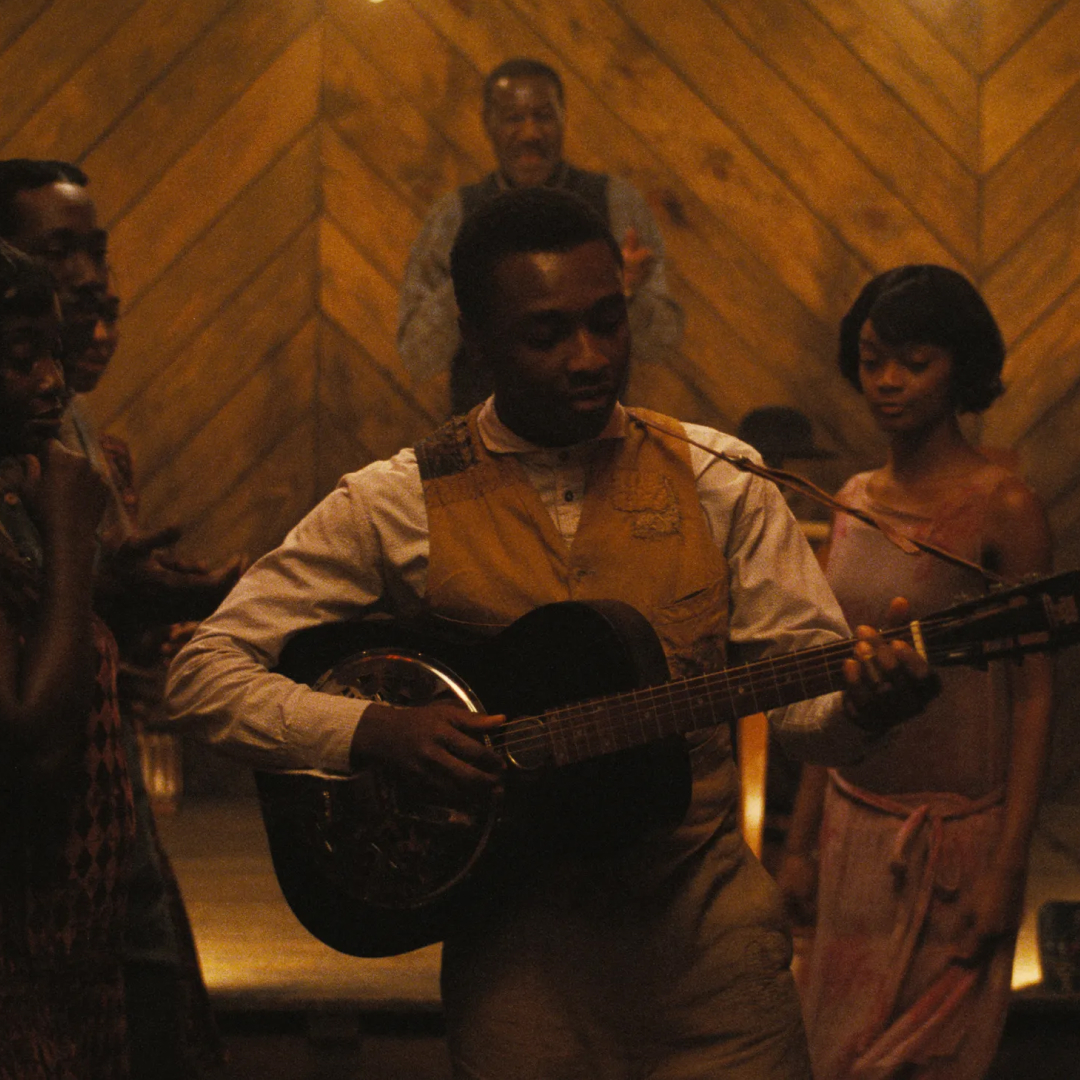 In 'Sinners,' Music From the Past Liberates Us From the Present
In 'Sinners,' Music From the Past Liberates Us From the PresentIn its musical moments, Ryan Coogler's vampire blockbuster makes a powerful statement about Black culture, ancestry, and art.
By Quinci LeGardye
-
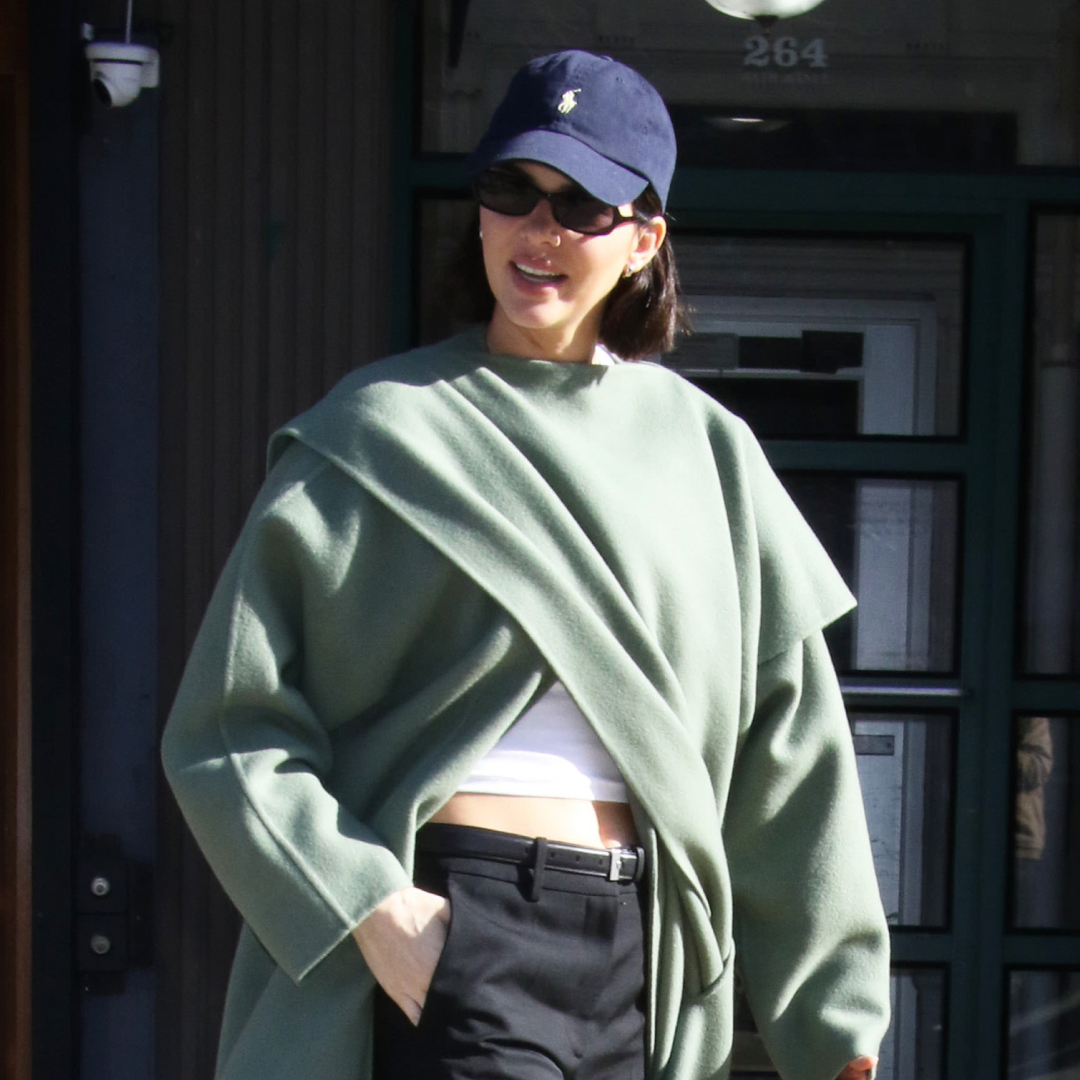 Kendall Jenner Has the Last Word on the Best Travel Shoes
Kendall Jenner Has the Last Word on the Best Travel ShoesLeave your ballet flats in your checked bag.
By Halie LeSavage
-
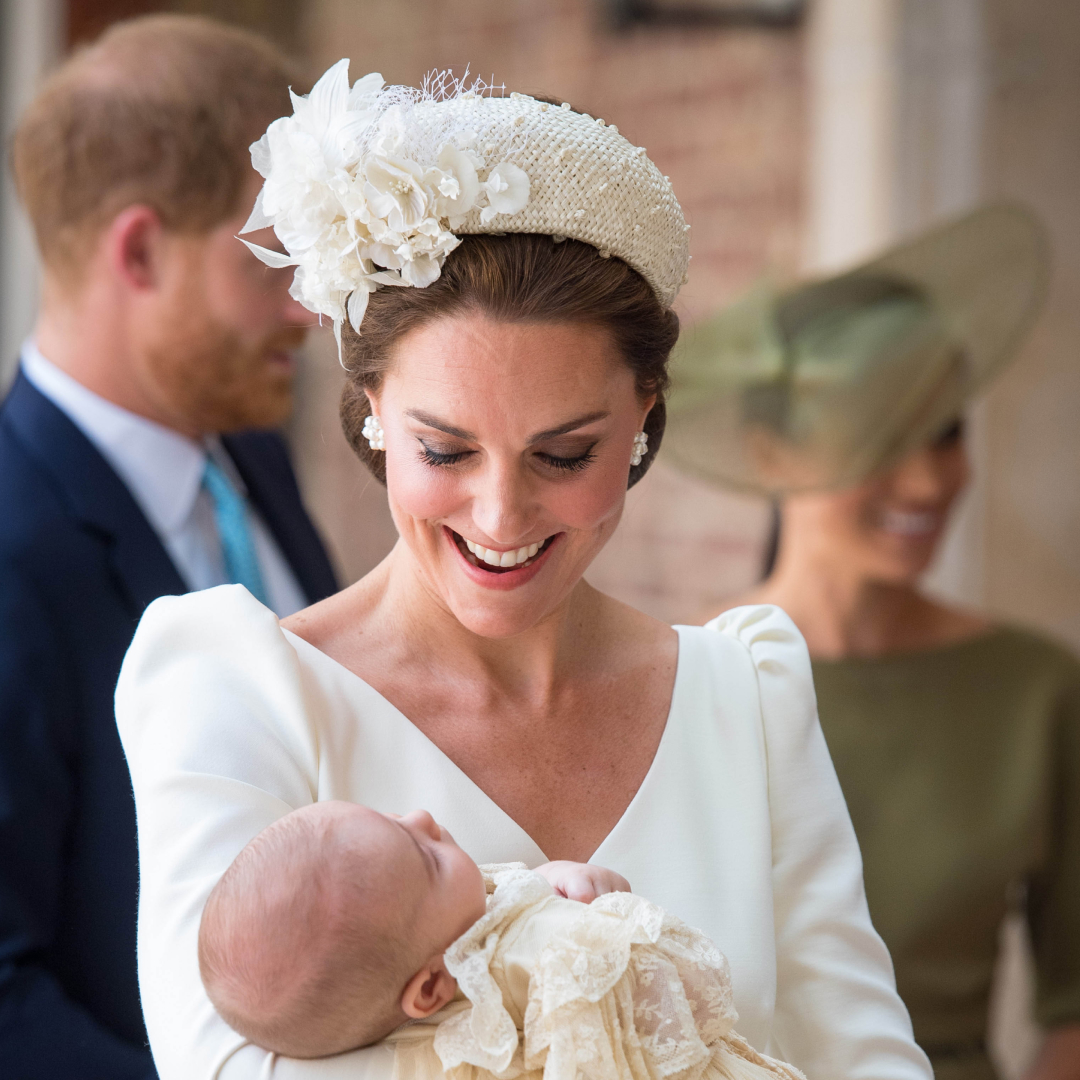 Prince Harry Gave Nephew Prince Louis an Extremely Rare Five-Figure Gift for His Christening
Prince Harry Gave Nephew Prince Louis an Extremely Rare Five-Figure Gift for His ChristeningUncle Harry for the gifting win.
By Kristin Contino
-
 36 Ways Women Still Aren't Equal to Men
36 Ways Women Still Aren't Equal to MenFeatures It's just one of the many ways women still aren't equal to men.
By Brooke Knappenberger
-
 How New York's First Female Governor Plans to Fight for Women If Reelected
How New York's First Female Governor Plans to Fight for Women If ReelectedKathy Hochul twice came to power because men resigned amid sexual harassment scandals. Here, how she's leading differently.
By Emily Tisch Sussman
-
 Why the 2022 Midterm Elections Are So Critical
Why the 2022 Midterm Elections Are So CriticalAs we blaze through a highly charged midterm election season, Swing Left Executive Director Yasmin Radjy highlights rising stars who are fighting for women’s rights.
By Tanya Benedicto Klich
-
 Tammy Duckworth: 'I’m Mad as Hell' About the Lack of Federal Action on Gun Safety
Tammy Duckworth: 'I’m Mad as Hell' About the Lack of Federal Action on Gun SafetyThe Illinois Senator won't let the memory of the Highland Park shooting just fade away.
By Sen. Tammy Duckworth
-
 Roe Is Gone. We Have to Keep Fighting.
Roe Is Gone. We Have to Keep Fighting.How To Democracy always offers a path forward even when we feel thrust into the past.
By Beth Silvers and Sarah Stewart Holland, hosts of Pantsuit Politics Podcast
-
 The Supreme Court's Mississippi Abortion Rights Case: What to Know
The Supreme Court's Mississippi Abortion Rights Case: What to KnowThe case could threaten Roe v. Wade.
By Megan DiTrolio
-
 Sex Trafficking Victims Are Being Punished. A New Law Could Change That.
Sex Trafficking Victims Are Being Punished. A New Law Could Change That.Victims of sexual abuse are quietly criminalized. Sara's Law protects kids that fight back.
By Dr. Devin J. Buckley and Erin Regan
-
 My Family and I Live in Navajo Nation. We Don't Have Access to Clean Running Water
My Family and I Live in Navajo Nation. We Don't Have Access to Clean Running Water"They say that the United States is one of the wealthiest countries in the world. Why are citizens still living with no access to clean water?"
By Amanda L. As Told To Rachel Epstein